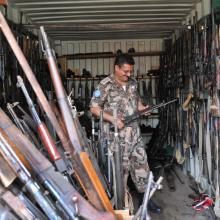arms trade treaty
IN 1988, a bronze sculpture of Carl Fredrik Reuterswärd’s knotted gun was placed outside the United Nations headquarters in New York. As Kofi Annan, former U.N. secretary general and Nobel Peace laureate, remarked at its unveiling, the sculpture isn’t just a cherished piece of art, but a powerful symbol that encapsulates in a few simple curves the greatest prayer of humanity: not for victory, but for peace.
Inside the U.N. building is a mosaic representing all the nations of the Earth, accompanied by Jesus’ words, “Do unto others what you would have others do unto you.” For many seasoned peace campaigners, myself included, this prayer was partly answered when the 193-nation U.N. General Assembly overwhelmingly approved the Arms Trade Treaty in April.
The treaty seeks to regulate the international trade in conventional arms, from small arms to tanks, combat aircraft, and warships. It aims to foster peace and security by putting a stop to the destabilizing flow of arms to conflict regions. This process cannot, however, be only a matter of negotiation and numbers. What needs to undergird the treaty is protecting humans, made in God’s image. What needs to motivate the treaty is ensuring the possibility of what philosopher Hans Jonas called “the permanence of an authentically human life on Earth.”
The statistics are frightening. Globally, one person dies every minute from armed violence. This treaty will help halt the uncontrolled flow of arms and ammunition that fuels wars, atrocities, and rights abuses. The devastating humanitarian consequences of the two-year war in Syria, a war fueled in part by the irresponsible export of arms, underline just how urgently this treaty is needed.
On April 2, the United Nations passed an innovative Arms Trade Treaty aimed at regulating the massive global trade in conventional weapons, for the first time linking arms sales to the human rights records of the buyers. For the first time arms manufacturers and dealers will have to consider the end use of their product — how will their customers use the weapons and to make that information public. The May-June 2013 issue of Maryknoll's NewsNotes explains the potential positive impact the treat could have on women and girls:
A particular element of the Treaty that is cause for much celebration is the inclusion of language that protects women and girls from armed gender-based violence (GBV). In the Preamble of the ATT, it states "that civilians, particularly women and children, account for the vast majority of those adversely affected by armed conflict and armed violence."In the United Nations Declaration on the Elimination of Violence Against Women, violence against women and girls is defined as "any act of gender-based violence that results in, or is likely to result in, physical, sexual or psychological harm or suffering to women [or girls], including threats of such acts, coercion or arbitrary deprivation of liberty, whether occurring in public or in private life."Under Article 7.4 of the Arms Trade Treaty, GBV is included as a binding criterion for considering whether or not to export arms. The exporting party must consider the overriding risk of potential violations of international humanitarian law (IHL), international human rights law (IHRL) and must take into account the risk that the transfer will be "used to commit or facilitate serious acts of gender based violence or serious acts of violence against women and children."
Read the rest here: http://www.maryknollogc.org/article/arms-trade-treaty-global-victory-women-girls
There’s a famous maxim that says, “The only thing necessary for the triumph of evil is for good men to do nothing.” Though Wikipedia says otherwise, the statement is often attributed to Edmund Burke.
I doubt that Wikipedia will give me the credit for this 200 years from now, but I’d like to take a crack at a counterpoint to Burke’s famous maxim anyway: Sometimes evil triumphs not when good people do nothing, but when good people fail to distinguish between hypothetical evil and real evil, and end up doing something about the former when they should be doing something about the latter.
Case in point: National Conservative Christian radio host Kerby Anderson’s attempt to rally his followers to thwart the Senate from ratifying the Arms Trade Treaty.

